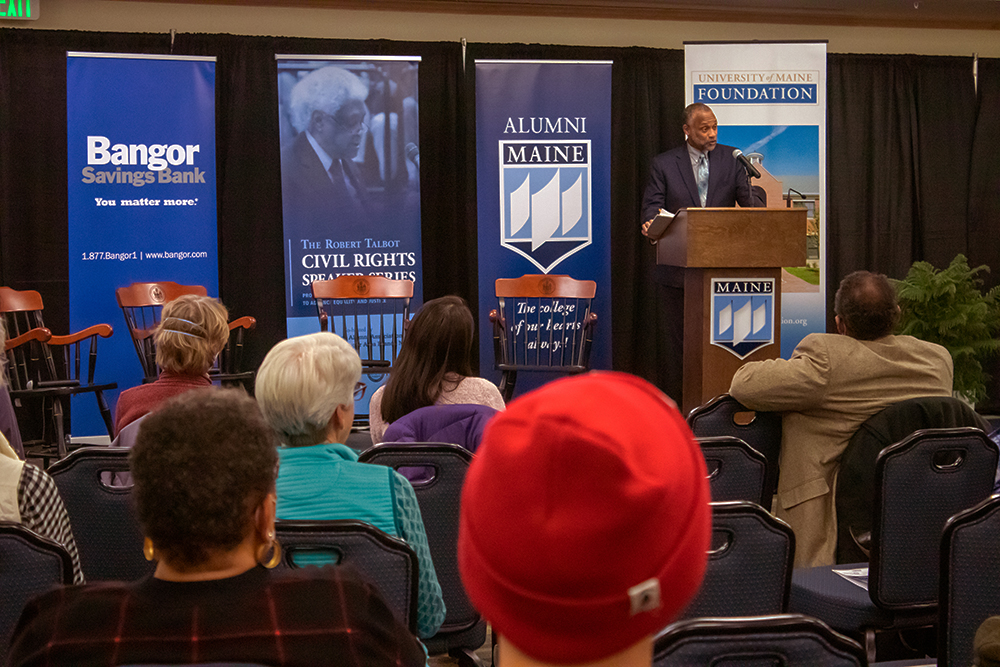On Thursday, Nov. 17, the University of Maine Alumni Association and the Greater Bangor Branch of the NAACP welcomed Maine’s first Black Supreme Judicial Court Associate Justice, Rick E. Lawrence, in the Wells Conference Center for the 2nd annual Robert Talbot Civil Rights Speaker Series. Lawrence led a presentation titled “Civil Rights and the Law: A Court Perspective.”
Joan Ferrini-Mundy, the president of UMaine and the University of Maine at Machias, spoke in her welcome remarks about the university’s valued commitment to diversity, equity and inclusion as the evening commenced.
Thomas Peaco, who stepped into the role of president and CEO of the UMaine Alumni Association this past July, explained that this series was created to honor Robert Talbot’s accomplishments as a civil rights advocate and leader in the state of Maine. The Talbot Fund was created with the goal of bringing accomplished speakers to Maine for discussions on civil rights issues in an environment that is open to all and free of charge.
Talbot, a Bangor native, personally attended the event.
“[Talbot is one of the] foremost leaders in the pursuit of racial equity, justice, and nondiscriminatory policies and practices,” Ferrini-Mundy said.
Another member of Talbot’s family is currently following in his inspirational footsteps in the Maine State Legislature. Representative Rachel Talbot Ross from Portland, Maine, has officially been announced as the state’s first Black Speaker of the House. She is set to be sworn in during the House’s 131st legislative session on Dec. 7.
Earlier this year, Governor Janet Mills appointed Justice Rick Lawrence to the Maine Supreme Judicial Court. His presentation focused on three prominent issues in today’s society where racial factors play a key role: voting rights, reproductive rights and race-conscious college admissions policies.
Lawrence explained how Black citizens and other minority groups are often disproportionately affected by the limitations placed on these categories.
After Lawrence’s presentation, Peaco joined him on stage to direct a panel discussion that featured attorneys Ukeme Awakessien Jeter and Angela Okafor.
Jeter, a 2004 UMaine graduate, serves as both a lawyer and a community activist working to promote racial equality in the Upper Arlington (Ohio) City Council. Okafor shares a similar passion of advocating for the underrepresented citizens within her community, as she has been on the Bangor City Council for the past three years and is the Acting Director of Outreach and Community Engagement for the State of Maine’s Permanent Commission on the Status of Racial, Indigenous and Tribal Populations.
All panel members shared their insightful thoughts on the importance of increased communal engagement and representation in order to allow minorities to have a real sense of belonging, especially in a place like Maine where diversity is not often prevalent.
Jeter reflected on the lack of representation she felt as a Black student during her time at UMaine. She also recalled that the town she lived and worked in did not feel like home, as she needed to travel as far as Boston just to find a salon that could do her hair correctly.
“Fitting in is not the same as belonging. The sense of belonging is created by infrastructure and resources,” Jeter said.
Lawrence was allowed the final words of the evening. He explained that a valuable way for minority members of a community to get more involved in cases that pertain to racial justice is to apply to be part of a jury list, so they can potentially be selected as a deciding factor in defending civil rights for all.
All panelists agreed that an effective way to achieve representation is to simply keep discussing issues of racial injustice with anyone who will listen; avoiding these conversations hinders progress.








